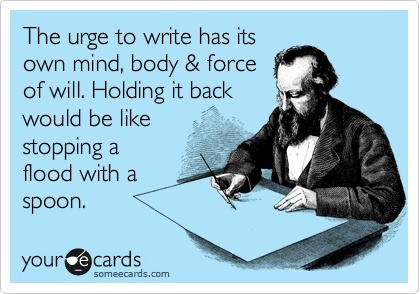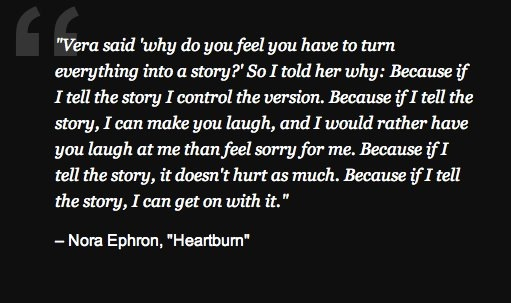In my novel, Ghostwriter, Seth writes as a way to escape from a tragic past. Today, while finishing up the final round of edits, i thought about what makes writers want to put a pen to the blank page.

The answer to the question, Why do you write? is as varied and unique as each writer themselves. Some do it because they must, others because they want to share or create. In the movie V for Vendetta, Natalie Portman's character Evey says: "My father was a writer. You would've liked him. He used to say that artists use lies to tell the truth, while politicians use them to cover the truth up."
I came across this lovely letter written by poet Rainer Maria Rilke. He had been sent a letter by an aspiring poet named Franz Kappu. Kappu sought to know whether he should continue as a poet. Rilke wrote back to him, and a correspondence began between them which was to last for five years.
Search for the reason that bids you write; find out whether it is spreading out its roots in the deepest places of your heart, acknowledge to yourself whether you would have to die if it were denied you to write. This above all—ask yourself in the stillest hour of your night: must I write? Delve into yourself for a deep answer. And if this should be affirmative, if you may meet this earnest question with a strong and simple, "I must," then build your life according to this necessity; your life even into its most indifferent and slightest hour must be a sign of this urge and a testimony to it.
(Do read the rest of the letter. It's one of the prettiest love letters to writing itself that I've ever read.)
Perhaps a question much like this was in Emily Dickinson's mind when she wrote this line: "This is my letter to the world/ That never wrote to me ..."
 |
| I do not know who wrote this. I wish I did. |
From an essay written by Joan Didion:
... I knew that I was no legitimate resident in any world of ideas. I knew I couldn’t think. All I knew then was what I couldn’t do. All I knew was what I wasn’t, and it took me some years to discover what I was.
Which was a writer.
By which I mean not a "good" writer or a "bad" writer but simply a writer, a person whose most absorbed and passionate hourse are spent arranging words on pieces of paper. Had my credentials been in order I would never have become a writer. Had I been blessed with even limited access to my own mind there would have been no reason to write. I write entirely to find out what I’m thinking, what I’m looking at, what I see and what it means. What I want and what I fear. Why did the oil refineries around Carquinez Straits seem sinister to me in the summer of 1956? Why have the night lights in the bevatron burned in my mind for twenty years? What is going on in these pictures in my mind?
And perhaps, in some instances, there's a bit of ego involved. Reginald Shepherd wrote this response:
I write because I would like to live forever. The fact of my future death offends me. Part of this derives from my sense of my own insignificance in the universe. My life and death are a barely momentary flicker. I would like to become more than that. That the people and things I love will die wounds me as well. I seek to immortalize the world I have found and made for myself, even knowing that I won't be there to witness that immortality, mine or my work's, that by definition I will never know whether my endeavor has been successful. But when has impossibility ever deterred anyone from a cherished goal?
Some write because they find reality unsatisfactory. In honor of National Day on Writing (which, apparently, is a thing) The New York Times asked writers to Tweet their reasons for writing. Neil Gaiman Tweeted this: “Because I can lie beautiful true things into existence, & let people escape from inside their own heads & see through other eyes."
The reason why I write is a combination of all of the above. I've always written; I cannot remember a time before I was dreaming up fantastic realms or exploring possibilities in this one. The difference is now that I'm actually typing out the words instead of "writing" the books and stories in my head. I'm not particularly interested in immortality for myself, but I like the idea of my stories living on after I am gone.





As a high school literacy coach, I plan to use this blog post with my faculty and students if that is okay with you. I especially want the students in the book club I sponsor to read it, too.
ReplyDeleteI have enjoyed every story you have written in FF because of the richness of words, characters, plots, and themes. Your passion for writing is obvious in everything you create.
Thank you for sharing this passion with us. It is an inspiration.
You have my permission and my thanks.
DeleteAs usual, you have inspired me once again. My writing used to be cathartic. I now find so many things I want to say much easier to do by pen, er, keystroke...whatever.I remember a guy on train that had a pin on his lapel that said "just because you call it art, it doesn't make you an artist." Now, at this time 2 years later, I would have told him, "Yes I am. In my own eyes, I am a valid artist-or writer." My insecurities of taking it out of my hard drive and publishing it are what I'm still overcoming. If they won't publish, I have chosen to still call myself a writer, because that is the best medium I have!
ReplyDeleteI'd bet money that the man wearing that button was one of those anti-NEA snobs who thinks that his own tastes should be the definition of what "art" is.
DeleteArt, quite simply, is symbolic human expression. It does not have to be pretty or follow a set standard of technical merit or form. Picasso's "Guernica" is one of the ugliest paintings I have ever seen, but that is part of what makes it one of the most powerful pieces of art mankind has ever created. Because it is the brutal horror of war, stark upon the canvas. The silent, agonized scream of the woman holding the broken infant needs no interpretation.
An artist is someone who creates those pieces which speak of the human experience. It inspires emotion or thought in the person who beholds it. Just how this emotional osmosis is accomplished depends on both the artist and the medium they choose, but it is art if it achieves its aim of communication.
Trying to define it in a narrow category of what is "good art" by one's own tastes is painfully myopic, and the person who does so is to be pitied, for they are missing out on some of the most poignant expressions of the human condition.
Rilke is one of my favourite poets :)
ReplyDelete